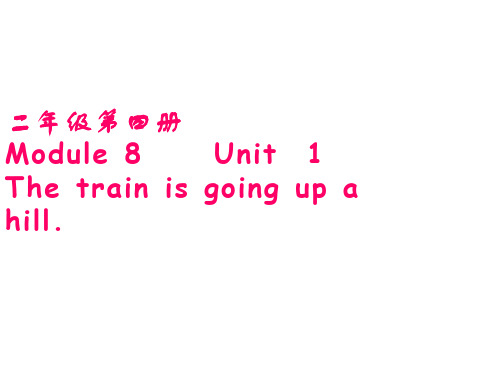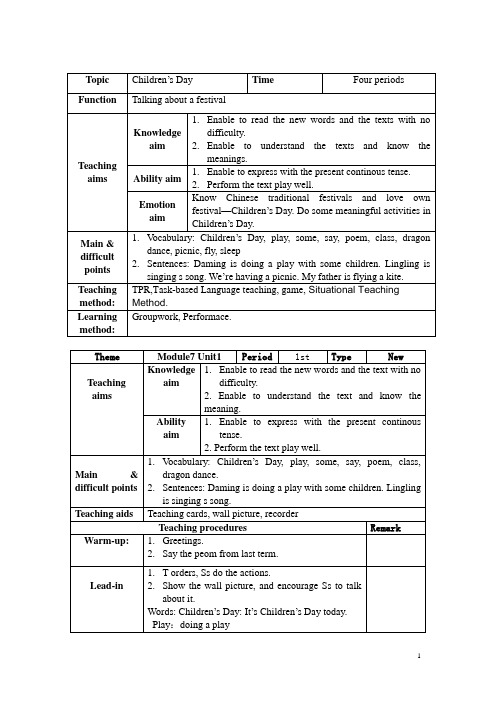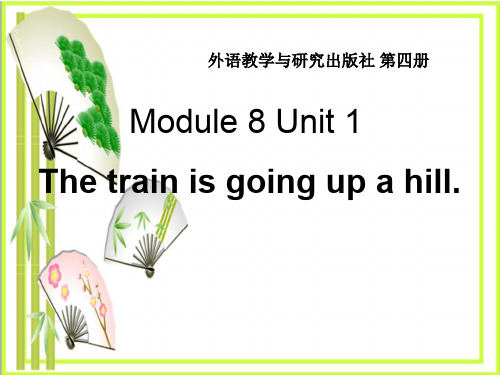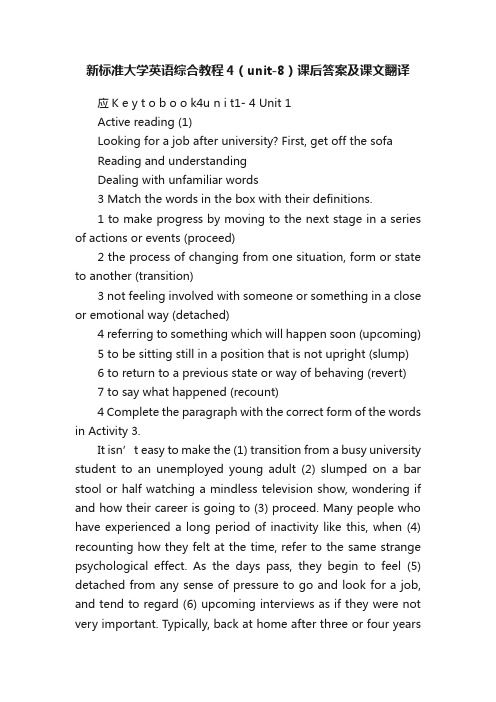新标准第四册Module 8 Unit 1 The train is going up a hil课件
- 格式:ppt
- 大小:8.53 MB
- 文档页数:44




Module 8 ChangesUnit 1 I was two《英语》(新标准)三年级起点,第四册一、教材分析:本模块主要围绕过去发生的事情来展开,Unit1通过Lingling爷爷奶奶照片,来描述过去发生的事情,出现了过去与现在的句型运用,Unit2 则着重呈现了过去时的几组反义词,从新授到复习,来帮助学生回忆曾经学过的知识。
本模块是第一次接触过去时的表达法。
要让学生达到会运用是比较难的。
在Unit 1中,重点突出教I was 的用法。
在学生理解并学会I was的用法后,在Unit2中,扩展到were以及其否定用法。
二、教学目标(一)技能和知识目标1、基本能听懂会说,会读,会写grandparent, then, hair, was, were2、基本能听懂,会说,会读句型:Iwas….. They were…..3、初步掌握词汇so4、巩固复习词汇big, small,tall,short,long,fat,thin,old,young, naughty,cute.及句型I’m…..who is that littlegirl? It’s…..(二)能力目标学生能够运用Was和were来描述过去,介绍自己或他人过去的事情。
(三)情感目标1、培养学生主动用英语与他人交流,能积极与他人合作,共同参与,合作完成学习任务。
2、通过对本课的学习,让学生学会对事物进行分析与观察,培养学生的观察能力和判断能力。
三、教学重点和难点(一)重点1、词汇:grandparent,then,hair,was,were2、句型:I was….. They were……(二)难点Then 的发音和各种人称的灵活运用。
四、教学用具教学用书,录音机,磁带,照片,单词卡片,多媒体课件五、教学方法:创设情景,小组合作,分角色朗读等。
六、教学设想:本模块是第一次接触一般过去时。
教师应该借助图片或多媒体或举一些贴近学生生活实际的例子,让学生理解过去与现在的对比。

新标准大学英语综合教程4(unit-8)课后答案及课文翻译应K e y t o b o o k4u n i t1- 4 Unit 1Active reading (1)Looking for a job after university? First, get off the sofaReading and understandingDealing with unfamiliar words3 Match the words in the box with their definitions.1 to make progress by moving to the next stage in a series of actions or events (proceed)2 the process of changing from one situation, form or state to another (transition)3 not feeling involved with someone or something in a close or emotional way (detached)4 referring to something which will happen soon (upcoming)5 to be sitting still in a position that is not upright (slump)6 to return to a previous state or way of behaving (revert)7 to say what happened (recount)4 Complete the paragraph with the correct form of the words in Activity 3.It isn’t easy to make the (1) transition from a busy university student to an unemployed young adult (2) slumped on a bar stool or half watching a mindless television show, wondering if and how their career is going to (3) proceed. Many people who have experienced a long period of inactivity like this, when (4) recounting how they felt at the time, refer to the same strange psychological effect. As the days pass, they begin to feel (5) detached from any sense of pressure to go and look for a job, and tend to regard (6) upcoming interviews as if they were not very important. Typically, back at home after three or four yearsaway, they (7) revert to old habits, start seeing old friends, and, in many cases, become dependent again on their parents.5 Replace the underlined words with the correct form of the words in the box. You may need to make other changes.1 I went to a mixed-ability secondary school just outside London. (comprehensive)2 I got stopped by a policeman who asked to see my driving licence. (cop)3 Have you seen this beautiful from the air view of Oxford? (aerial)4 Isabel tightly her bag as she walked down the corridor towards the office. (clutched)5 You should speak to Toby; he’s an supporter of flexible working hours. (advocate)6 I hurt my leg badly a couple of months ago, and it still hasn’t got better completely. (healed)6 Answer the questions about the words.1 Is a dead-end job one with (a) exciting prospects, or (b) no future?2 Is a tricky problem (a) difficult, or (b) easy to solve?3 If an activity saps all your energy, do you feel (a) tired, or(b) more active than usual?4 Does a pushy person try to (a) persuade you to do something you don’t want to, or (b) help you by listening to what you have to say?5 If you feel apathy, do you want to (a) change the world, or(b) stay at home and do nothing?7 Answer the questions about the phrases.1 Is fork out (a) a formal, or (b) an informal way of saying to pay for something?2 If you are in the same boat as another person, are you (a) making the same journey together, or (b) in the same difficult or unpleasant situation?3 If you feel you have come full circle, do you (a) feel you are back where you started, or (b) feel a sense of satisfaction because you have completed something?4 If someone takes a soft line, do they deal with a person (a) in a kind and sympathetic way, or (b) in a lazy way without makinga decision?5 If you strike the right note about something, are you expressing yourself (a) well, or (b) badly?6 If you do something by all means, do you (a) try your best to do it, or (b) not care about it?7 If you nudge someone back into the saddle, are you encouraging them to (a) take responsibility again, or(b) take it easy?8 If you talk through a problem with someone, do you (a) examine it carefully and sensitively, or (b) refer to it quickly and then change the subject?Active reading (2)If you ask meDealing with unfamiliar words4 Match the words in the box with their definitions.1 funny or entertaining (amusing)2 used for emphasizing that something good has happened, especially because of good luck (fortunately)3 an amount of money that a person, business or country borrows, usually from a bank (loan)4 to take an amount or number from a total (deduct)5 the most exciting, impressive, or interesting part of anevent (highlight)6 to show that you understand someone’s problems (sympathize)7 needing a lot of time, ability, and energy (demanding)5 Complete the conversation with the correct form of the words in Activity 4.A After three years at university, I’m now quite heavily in debt.B I (1) sympathize with you, I know what it’s like to have financial problem s. But (2) fortunately I didn’t need to take out a student (3) loan when I was at university, because I had a part-time job.A What did you do?B I worked in a restaurant at weekends.A That must have been very (4) demanding.B Yes, it was. I had to get the right balance between work and study. But the other people who worked there were good fun to be with, so it was quite (5) amusing too. The (6) highlight of the weekend was always Saturday night when we worked overtime.A But I don’t expect you made a lot of money?B No, there wasn’t much after they’d (7) deducted tax and pension contributions. But it was enough to keep me going.6 Replace the underlined words with the correct form of the words in the box. You may need to make other changes.1 When I was at college I kept all my personal things in an old cupboard.2 A lot of people who leave university before getting a degree end up in good jobs.3 I think she’ll get a good degree, but I wouldn’t risk my money on the exact result.4 The money I spent at college was more than what I earned in my part-time job.5 The chances of my being offered a job after that interview must be quite remote.6 Our business has done very well since we changed our advertising.7 I think telling the truth and not cheating is always the best policy.Key:(1) belongings (2) dropouts (3) gamble (4) exceeded (5) odds(6) has thrived (7) honesty7 Answer the questions about the words and expressions.1 If something is not all it’s cracked up to be, is it (a) valid and interesting, or (b) just a little bit disappointing?2 If someone keeps banging on about something, are you likely to be (a) interested in, or (b) bored by what they say?3 If there is a lot of hassle in your life, are you likely to feel (a) stressed, or (b) relaxed?4 If something happens out of the blue, is it (a) unexpected, or (b) part of your plan?5 If you say you ended up in a particular job, do you suggest that (a) you have fulfilled your ambition, or(b) it happened almost by chance?6 Are the regulars in a pub (a) the customers who come very often, or (b) the food the pub offers most often?7 If something is dead easy, is it (a) very easy, or (b) not easy at all?8 If you treat someone to something, do you (a) buy something nice for them, or (b) behave badly to them?9 If you cheer a place up, do you (a) make the place lookbrighter, or (b) make the people in the place happier?Reading and interpreting8 Look at the sentences from the passage and identify the style features.1 Twelve years at school and three years at university, teachers banging on about opportunities in the big wide world beyond our sheltered life as students, and what do I find?This shows the informality of an incomplete sentence in the first part, the use of an informal expression (banging on) and a rhetorical question to the reader (What do I find?)2 Try as I might to stay cheerful, all I ever get is hassle, sometimes with people (especially boys, god, when will they grow up?) …This has the use of an informal word (hassle), an informal exclamation (god) and a question to the reader (When will they grow up?)3 Actually, I had my eye on the course at the London School of Economics (LSE).Here there is a discourse marker typical of speech (Actually) and an informal phrase (had my eye on).4 I kind of understand it, and not just because my degree is in economics.Here “kind of” is a sort of discour se marker of informal speech (showing something is general, vague or not definite).5 I wanted something in finance and investments, because you know, maybe with a job like that, I could use my degree.This has a discourse marker of informal speech (you know).6 ... it’s true, he really did seem to have three hands.Again here is a discourse marker of informal speech (it’s true).7 I talked to him about ... well, about pretty well everything …This has another discourse marker of informal speech (well) and an informal phrase (pretty well). Language in use word formation: compound nouns1 Write the compound nouns which mean:1 a degree which is awarded a first class (a first-class degree)2 work in a hospital (hospital work)3 a ticket for a plane journey (a plane ticket)4 a discount for students (a student discount)5 a pass which allows you to travel on buses (a bus pass)6 a room where an interview is held (an interview room)7 a period spent in training (a training period)word formation: noun phrases2 Write the noun phrases which mean:1 a career which is rewarding from the financial point of view(a financially rewarding career)2 legislation which has been introduced recently (recently introduced legislation)3 instructions which are more complex than usual (unusually complex instructions)4 an institution which is orientated towards academic (academically orientated work)5 work which makes physical demands on you (physically demanding work)6 information which has the potential to be important (potentially important information)7 candidates who have been selected after a careful procedure (carefully selected candidates)8 a coursebook in which everything has been planned beautifully (a beautifully planned textbook) try as … might3 Rewrite the se ntences using try as … might .1 I’m trying to fill this last page, but I just can’t think of anything.Try as I might to fill this last page, I just can’t think of anything.2 I try to be friendly with Marta, but she doesn’t seem to respond.Try as I migh t to be friendly with Marta, she doesn’t seem to respond.3 I try hard to get to sleep, but I can’t help thinking about my family.Try as I might to get to sleep, I can’t help thinking about my family.4 He just doesn’t seem to get the promotion he deserve s, even though he keeps trying.Try as he might, he just doesn’t seem to get the promotion he deserves. / Try as he might to get the promotion he deserves, he just doesn’t seem to get it.5 I keep trying to remember her name, but my mind is a blank.Try as I might to remember her name, my mind is a blank.given that …4 Rewrite the sentences using given that …1 Since I know several languages, I thought I would look for work abroad.Given that I know several languages, I thought I would look for work abroad.2 Xiao Li has the best qualifications, so she should get the job.Given that Xiao Li has the best qualifications, she should getthe job.3 Since we’r e all here, I think it would be a good idea to get down to some work.Given that we’re all here, I thin k it would be a good idea to get down to some work.4 Since it’s rather late, I think we should leave this last task until tomorrow.Given that it’s rat her late, I think we should leave this last task until tomorrow.clauses introduced by than5 Rewrite the sentences using clauses introduced by than .1 She’s experienced at giving advice. I’m more experienced.She’s less experienced at giving advice than I am. / I’m more experienced at giving advice than she is.2 You eat too much chocolate. It isn’t good for you.You eat too much chocolate than is good for you.3 She worked very hard. Most part-timers don’t work so hard.She worked harder than most part-timers do.4 You have arrived late too many times. That isn’t acceptable.You have arrived late more times than is acceptable.5 I don’t think you should have given so much personal information. It isn’t wise.I think you have given more personal information than is wise.collocations6 Read the explanations of the words. Answer the questions.1 highlight A highlight is the most exciting, impressive, orinteresting part of an event.(a) What would you like to be the highlight of your career?I would like the highlight of my student career to be to receive a national award for the best student research project.(b) How can you highlight an important sentence in a text?You can underline it in pencil or pen or you can use coloured pens or highlighters.(c) What are the edited highlights of a football match?The highlights are when someone scores a goal or prevents one from being scored.2 loan A loan is an amount of money someone borrows from someone else.(a) Have you ever taken out a loan?No, I haven’t. But m y parents have taken out several loans to buy kitchen equipment.(b) What is the best way to pay off a loan?It is best to pay a loan off quickly, although you will still have to pay some interest.(c) If you have a library book on loan, what do you have to do with it?You have to return it before the date it is due, otherwise you may have to pay a fine.3 thrive To thrive means to be very successful, happy or healthy.(a) What sort of business thrives best in your part of the country?In my part of the country, light industries and electronics companies thrive.(b) Which sort of plants thrive in a hot climate?In a hot climate you can see tropical fruit and vegetablesthrive and also tropical plants and trees.(c) Why do you think some couples thrive on conflict?It is difficult to understand why some couples thrive on conflict. Maybe each one wants to compete with the other or maybe they enjoy “kissing and making up” after the conflict.7 Translate the paragraphs into Chinese.If you ask me, real life is no t all it’s cracked up to be. Twelve years at school and three years at university, teachers banging on about opportunities in the big wide world beyond our sheltered life as students, and what do I find?Try as I might to stay cheerful, all I ever get is hassle, sometimes with people (especially boys, god, when will they grow up?), but mostly with money. It’s just so expensive out here! Everyone wants a slice off you. The Inland Revenue wants to deduct income tax, the bank manager wants repayments on my student loan, the landlord wants the rent, gas, water, electricity and my mobile bills keep coming in, and all that’s before I’ve had anything to eat. And then some bright spark calls me out of the blue, asking if I’m interested in buying a pension. At this r ate, I won’t even last till the end of the year, let alone till I’m 60.(?翻译时可以根据上下文增译,即增加原文暗含了但没有直接表达出来的意思。

新标准大学英语综合教程4(unit1-8)课后答案及课文翻译B No, there wasn’t much after they’d (7) deducted tax and pension contributions. But it was enough to keep me going.6 Replace the underlined words with the correct form of the words in the box. You may need to make other changes.1 When I was at college I kept all my personal things in an old cupboard.2 A lot of people who leave university before getting a degree end up in good jobs.3 I think she’ll get a good degree, but I wouldn’t risk my money on the exact result.5 The chances of my being offered a job after that interview must be quite remote.6 Our business has done very well since we changed our advertising.7 I think telling the truth and not cheating is always the best policy.Key: (1) belongings (2) dropouts (3) gamble (4) exceeded (5) odds(6) has thrived (7) honesty7 Answer the questions about the words and expressions.1 If something is not all it’s cracked up to be, is it (a) valid and interesting, or (b) just a little bit disappointing?2 If someone keeps banging on about something, are youlikely to be (a) interested in, or (b) bored by what they say?3 If there is a lot of hassle in your life, are you likelyto feel (a) stressed, or (b) relaxed?4 If something happens out of the blue, is it (a) unexpected, or (b) part of your plan?5 If you say you ended up in a particular job, do yousuggest that (a) you have fulfilled your ambition, or (b) it happened almost by chance?7 If something is dead easy, is it (a) very easy, or (b) not easy at all?8 If you treat someone to something, do you (a) buy something nice for them, or (b) behave badly to them?9 If you cheer a place up, do you (a) make the place look brighter, or (b) make the people in the place happier?Reading and interpreting8 Look at the sentences from the passage and identify the style features.1 Twelve years at school and three years at university, teachers banging on about opportunities in the big wide world beyond our sheltered life as students, and what do I find?This has the use of an informal word (hassle), an informal exclamation (god) and a question to thereader (When will they grow up?)3 Actually, I had my eye on the course at the London Schoolof Economics (LSE).Here there is a discourse marker typical of speech (Actually) and an informal phrase (had my eye on).4 I kind of understand it, and not just because my degree is in economics.Here “kind of” is a sort of discourse marker of informal speech (showing something is general, vague or not definite).5 I wanted something in finance and investments, because you know, maybe with a job like that, I could use my degree.This has a discourse marker of informal speech (you know).6 ... it’s true, he really did seem to have three hands.Again here is a discourse marker of informal speech (i t’s true).7 I talked to him about ... well, about pretty well everything …This has another discourse marker of informal speech (well) and an informal phrase (pretty well).Language in use1 a degree which is awarded a first class (a first-class degree)2 work in a hospital (hospital work)3 a ticket for a plane journey (a plane ticket)4 a discount for students (a student discount)5 a pass which allows you to travel on buses (a bus pass)6 a room where an interview is held (an interview room)7 a period spent in training (a training period)word formation: noun phrases2 Write the noun phrases which mean:1 a career which is rewarding from the financial point of view (a financially rewarding career)2 legislation which has been introduced recently (recently introduced legislation)4 an institution which is orientated towards academic (academically orientated work)5 work which makes physical demands on you (physically demanding work)6 information which has the potential to be important (potentially important information)7 candidates who have been selected after a careful procedure (carefully selected candidates)8 a coursebook in which everything has been planned beautifully (a beautifully planned textbook)try as … might3 Rewrite the sentences us ing try as … might .。
一起新标准英语新教材2B M8教学设计本资料为woRD文档,请点击下载地址下载全文下载地址一年级起点第四册《module8Unit1》教学设计四块石小学教学目标:.知识与技能目标:学生能正确的书写hospital和stop 这两个单词,能够在语境中正确自如的运用going来描述路线。
能够准确恰当的运用目标语句“Thetrainisgoingupahill”来描述路线。
能流利的朗读课文,理解课文意思。
2.情感与态度目标:通过本课学习使学生保持并巩固英语学习的兴趣、敢干开口,乐于参与各种形式的学习活动,并在鼓励性评价中不断树立学习英语的自信心。
重点:学生能够能熟练运用”It’sgoingupahill.”目标语句来描述路线。
难点:学生对hospital的正确发音及对进行时的正确运用。
教学准备:教师:教科书,练习册,cAI,玩具小车,单词卡片,光盘。
学生:教材,taskpaper.教学过程:Stepone:warmer:.Greeting:Hello,everyone!2.Dotheactions:upupstandup;downdownsitdownStepTwo:PresentationT:Didyougoanyplaces?Showsomepicturestosay.Howdidyougo there?canyousaytheroutines?Todaywearegoingtolearnmo dule8Unit1.StepThree:Practice.Firstlistentothetapeandthink:whereisthegirl?2.Listenandrepeat,andthink:whereisthetrain?Lookatth eslideandchoose:Thetrainisgoing___ahill.3.Thenwhereisthetrain?Listentotape.judge:TrueorFalse4.Lookatthepictureandtrytoputthewordsinorder:Thetra inisgongpastthehospital.Ss:It’sgoingpastahospital.5.Gesturelanguageexerciseabout“goingup,goingdown,goingpast”6.Practisethesentences.Andhaveacompetition.7.Readthedialogue.StepFour:Production.Lookandguess:wherearethey?2.Listenandfollowtheroutewithyourfinger.Thenpointands ay.3.welcomeSscometothefrontandusetheirtraintodescribeth eroutinesfromschooltotheirhome.4.Taskpaper.StepFive:SummaryandhomeworkHomework:1.Readthetextafterclass.2.copythewords.板书设计module8Unit1Thetrainisgoingupthehill.downpastahospitalmodule8Unit2Thehorseisturningaround.教案设计四块石小学【教学目标】(一)知识目标:.学生能够正确听、说、读和拼写单词turn,again,jump,back,能够听说认读单词和短语around,turnaround,ground,comeback2.能听懂、会说和会读:Thehorseisturningaround.(二)能力目标:.通过说唱本单元的儿歌、童谣,培养学生听、说和唱的技能,同时提高学生自主学习能力。
新标准小学英语第四册module8教案module8changesUnit1Iwastwo一、教学目标:知识技能目标:1、能听、说、读、写并正确使用单词:who,me,then,hair,so,grandparents.2、能理解并使用was,were来谈论过去的事情和情况。
3、能听懂、会读、理解课文并回答相关的问题。
情感态度目标:培养学生的观察能力,发现人物和事物过去与现在的变化,保持他们对学习英语的热情。
学习策略目标:培养学生积极与他人合作,积极运用英语进行交流,在交流中发展运用语言的能力。
二、教学重点难点:、使用“was”“were”描述从过去到现在发生的变化。
2、听、说、读、写并正确使用单词:who,me,then,hair,so,grandparents.3、使学生在活动中完成对课文的理解,以及听、说、读、写的训练。
三、教具准备:多媒体、单词卡、图片四、教学过程:Step1.warmingupa.Greetingsb.Singasong:Londonbridgeisfallingdownc.Reviewtheadjectives.Bringoutsomecardsofadjectivesandletstudentstosaythe antonym.Giveastickertothestudentwhogivesthefirstans wer.Thenreviewtheadjectiveswiththewholeclass.Step2.Lead-in.Showapictureofyaoming.T:whoisthisman?Ss:Heisyaoming.T:Ishetall?Ss:yes,heis.ShowanotherpictureofyaomingT:Hewas…Ss:shortT:yes,hewasshort.Showapictureofmygrandparents.T:Thisismygrandparents.Nowtheyareold.Showanotherpictureofthem.T:Buttheywereyoungthen.T:Thisoneisme.Iwasten,then.NowIamtwenty-six.Letstudentstodiscussthechangesofthesesentences.Teacherexplaintheuseof“was,were”chant:Ifithappenedweuse“were”“was”.Ifitisnowweuse“am”“is”“are”.Nowlet’’schant:Now,now,now,am,is,andare.Iamtall.Heisfat.Now,wearehappy.Then,then,then,was,was,were.Iwasshort.Hewasthin.were,were,were,weyouandtheywere.Step3.Presentation排火车:S1:Iwas…then.Iam….now.S2:He/shewas….then.He/sheis…now.Iwas…then.Iam….now.……….Step4Text-learningT:boysandgirls,AmywasveryinterestedinLingling’sphotos.whataretheytalkingabout?Let’shavealook..Listentothetape,andanswerthequestions:①whoisthatlittlegirl?②HowoldwasLingling,then?2、Listenandrepeat3、T:Now,oneisAmy,oneisLingling,oneisLingling’smother.Readingroups.4、askseveralgroupstodisplay.5、Readthetexttogether.Step5consolidationsShewas……Nowsheis…….Hewas……..Nowheis……..Theywere…….Nowtheyare…….Iwas…….NowI’m……wewere……Nowweare……Step6.Homeworkmakeapost:Talkaboutthechangesofyourfamily.Unit2Theywereyoung.一.教学目标:.知识目标:(1)复习词汇:young,old,short,cute,thin,fat,tall,naught.(2)复习句型:Iwas…Theywere…基本能听懂、会说、会读句型:He/Shewasn’t___then.He/Shewas__.Itwasn’t__then.Itwas__.2.能力目标:学生能够运用was和were,wasn’t和weren’t来描述过去,介绍自己或他人过去的情况。
Unit 8Inside viewConversation 12. the true statements are :1 and 53. 1. Because Cathy is very busy2.She says she’ll do her best but can’t make any promises3.I’m Joe Varese , we spoke on the phone4.London architecture as well as the exhibition5.He wants to check the sound level6.The london Skyline, past, present and futureConversation 25. the topics that are mentioned are : 1,2,4,5,7 and 86. 1(c) 2(c) 3(b) 4(d) 5(a) 6(a)7. 1.one of the most recognizable2.to everyone’s astonishment3.Yes,absolutely4.That’s absolutely right5.I’m not convinced you’re right6.As you might expect7.ExactlyEveryday English8. 1(a) 2(a) 3(b) 4(a)Outside viewWatching and understanding2. size,architecture,train system,sculpture,airport,lake shoreline,music,sports teams3. 1(a) 2(b) 3(a) 4(c) 5(a) 6(d)4. 1. the third largest2.18713.curtains of glass4.15 years5.70 seconds6.840 flights7.29 miles of8.a wonderful sports historyListening inListening and understandingPassage 12. terminal 3: the newest terminal of Beijing AirportMarch 2008: date it became operationalNorman Foster: a famous British architectThree Kilometres: extent of the terminalThree and a half years: time it took to build the new terminalRed and gold :traditional Chinese colours usedSaving energy : reason for the roof design19000 pieces of luggage : number per hour the baggage system can handle3. the true statements are: 2,4,5 and 64. 1.became operational in March 20082.glass and steel3.light and heat /19,000 pieces ofte Dcember 20075.French architect6.the amount of sunlight7.glass curtain8.the gardens and treesPassage 26. 1(e) 2(a) 3(d) 4(b) 5(c) 1-3-4-2-5Listening and understanding7. 1.He is one of Spain’s great architect2.Bones3.The Dancing House4.Two5.Thirty-three years6.It is the tallest hotel in the world and it looks like a sail7.19978.Stucco。
新标准小学英语第四册Unit 1。
In this unit, students will learn about the topic of "My School Life". They will be introduced to new vocabulary related to school subjects, daily routines, and school facilities. The unit will also focus on the use of simple present tense to describe daily activities and routines.The unit begins with a warm-up activity to get students engaged and interested in the topic. Then, the teacher will introduce new vocabulary through pictures, real objects, and gestures to help students understand and remember the words. After that, students will practice using the new vocabulary in speaking and writing activities.Unit 2。
The second unit of the book is about "My Family". In this unit, students will learn about family members, relationships, and daily activities at home. They will also practice using possessive pronouns and simple present tense to describe their family members and their daily routines.The unit starts with a discussion about family and students will be encouraged to talk about their own families. Then, the teacher will introduce new vocabulary related to family members and daily activities at home. Students will have opportunities to practice using the new vocabulary in speaking and writing activities.Unit 3。